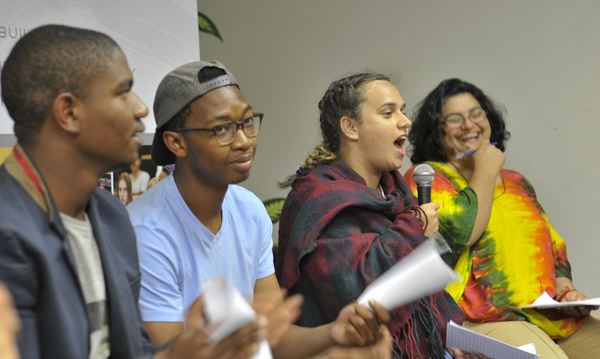

Vuyolwethu Toli of the Black Students’ Movement, Sikhukhile Duma of Open Stellenbosch and Alex Holz of RhodesMustFall addressed the audience at the Ashley Kriel memorial lecture. On the right is speaker Mandy Sanger. Photo by Mathieu Dasnois, Institute for Justice and Reconciliation.
23 October 2015
Students will shut down universities until there is agreement on a 0% fee increase next year, representatives of student organisations said in Cape Town last night.
“We are putting our bodies on the line, we are putting our futures on the line,” Alex Hotz of the RhodesMustFall movement at the University of Cape Town said.
She and representatives of the Black Students Movement and Open Stellenbosch were speaking on a panel at the Ashley Kriel Memorial Lecture at the Institute for Justice and Reconciliation.
Hotz said the immediate call was for all plans for fee increases to be dropped. But in the longer term the demand was for free education. “We aren’t fighting to get our names on a door or a building… we are fighting for our future.”
“It’s not because we have free time, or because we don’t want to write exams. If we want to have a future in this world we have to be on the ground,” she said.
Hotz said racism and financial exclusion at universities reflected what was happening in broader society.
“The whole system needs to be dismantled and rebuilt.”
Describing events on 22 October when police used stun grenades against students who had marched on Parliament to ask Higher Education minister Blade Nzimande to address them, she said: “In 2015 it feels as if we are living in a police state”.
Faced with black police officers, students had said “We are fighting for your children too,” Hotz said. “We asked them: Why are you defending a badge?”
Sikhulekile Duma from Open Stellenbosch said in the past it had been clear who “the enemy” was. “The enemy had a different colour. Now your enemy is the same colour as you, but wears the badge of the former oppressor.”
“This democracy is a facade,” said Duma.
The students were very critical of government policy since 1994.
“In 1994 we failed to decolonise,” said Vuyolwethu Toli, of the Black Students’ Movement at Rhodes University. “We didn’t get access to land and other necessary things.”
“We are in this now because of the economic policies of the government.”
“The state is not there for us,” said Hotz.
She said the university fee issue mostly affected black, especially working class black, students, but white students had been told they could support the protests by bringing food and water, which they had done, and by forming “a human shield” against the police. “Because we know the state”, she said.
To applause from the audience, she said it was clear across the country that “the women are leading this revolution”. There had been difficult discussions about “patriarchy” in their organisations, the students said.
“We call out comrades, especially men, who are hogging the megaphone”, said Hotz.
Duma said “men fighting for black male privilege” had left Open Stellenbosch after the patriarchy discussions and the organisation was better without them.
The students said they were united across all political party affiliations. “Students before parties,” said Duma.
He said students wanted to broaden their protest but would not claim to speak for the whole population. “We must remember students are only 0.5% of the population. Sometimes we speak as if we were 100%”, he said.
At Stellenbosch, he said, there were only six students from Kayamandi in a student population of 30,000.
The students said the demand that all universities put an end to outsourced labour was an important part of their campaign. They also called for a “decent living wage” for all workers.
“We have been focused on campuses but we are now looking wider,” Duma said.
“We are going to take what is ours,” said Hotz.
Correction after publication: The spelling of Alex Hotz’s surname has been corrected.